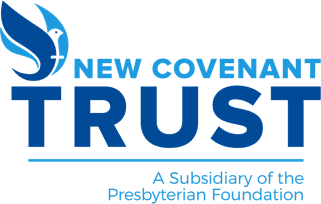
New Covenant Trust Company (NCTC) is passionate about helping Presbyterian congregations remain vibrant and sustainable. That’s why we recently partnered with the Episcopal Church Foundation and Charitable Solutions LLC to offer the webinar, “Giving Beyond Cash: Encouraging Creative Gift Making with Complex Assets.”
This informative session explored the challenges churches face in raising large gifts, ways church leaders can identify opportunities to encourage these gifts, and a common charitable giving vehicle that can be effectively used to manage various types of non-cash gifts. Below is a recap. To watch the video, click here.
Greg Rousos, President & CEO of NCTC, shared some illuminating recent research on charitable giving by Dr. Russell James, professor at Texas Tech University. It shows that churches do a great job of encouraging income-based gifts — i.e., cash or checks in the collection plate, online credit card donations, etc. Compared to other nonprofits, however, churches lag way behind in bringing in gifts of wealth. These may include distributions from retirement accounts, life insurance, or donations of real estate and other assets.
Demographic information on Presbyterian church members shows they have the wealth, but it’s largely untapped in terms of fundraising by our churches, Rousos explained. The information shows they are making gifts from wealth; however, they are not making these gifts to Presbyterian churches.
“When people give from wealth instead of income, there is a sixfold increase in the gift to the charity,” he added. “Encouraging gifts from wealth allows church members to examine their assets in their brokerage account, their property and other non-cash assets, and not just focus on their checking account. It allows donors to make smarter gifts, more tax efficient gifts, which result in larger gifts to ministry.”
Cash vs. Creative Giving
Bryan Clontz, Founder and President of planned giving risk management consulting firm Charitable Solutions, offered practical tips to help church leaders become better “bird dogs” for non-cash gift opportunities.
He said the “holy grail” of charitable planning is “making a contribution of an asset that has the lowest cost or tax basis — said simply, that’s appreciated the most and has the most capital gain — that’s been held for more than a year.”
Clontz went over the types of assets that fall under this broad category. These can include various investments, such as appreciated publicly traded stock, residential or commercial property, farmland, business interests, even cryptocurrency. He also pointed out that donors can choose to gift only a portion of their assets, like a percentage of ownership in an apartment building rather than handing over the entire deed.
With many Baby Boomers retiring and divesting their business interests and other assets, now is the perfect time to encourage them to direct a portion of their privately held business interests to the church, he added. These interests could be structured in the form of S Corps, C Corps or LLCs.
Clontz also encouraged church leaders to think outside the box. He has seen gifts from some unusual assets over the years — from a condo in Paris to a Major League Baseball team to taxidermy animals.
Practically speaking, Clontz explained that non-cash gifts have many tax advantages and other benefits to the donor that cash gifts simply do not. In an example he cited about gifting appreciated Amazon stock, Clontz said, “I’m able to get a full fair market value deduction, and pay no capital gains tax.” This easily applies to real estate and other assets as well. For property, it’s also important to factor in depreciation.
Donor-Advised Funds
Once church leaders have identified potential creative, non-cash gifts, what are the mechanisms for receiving them?
Donor-advised funds “were put on this earth for non-cash donations,” according to Clontz. “So many of these gifts are very large — for us, $4.4 million is the average. Do most of those donors give all of that to one charity? …. No, they’re giving to multiple charities.”
The donor-advised fund is one of the fastest growing philanthropic tools, said Jim Murphy, Director of Stewardship Resources and Operations at the Episcopal Church Foundation (ECF). In fact, they are an ideal vehicle to be used alongside the giving of complex assets.
ECF works collaboratively with NCTC and the Presbyterian Church (U.S.A.) Foundation to offer donor-advised funds to both church members and nonmembers. “The fund itself operates quite simply,” Murphy explained. “A donor makes a fully tax-deductible contribution to their donor-advised fund and receives in exchange a tax deduction in the year that they make the gift.”
“Anyone can create one,” he added. “We purposely keep the minimum starting donation quite low so that it is accessible to everyone. There are numerous investment options that you can recommend for your donor-advised fund, and you can make a grant to any qualified charity,” including your church.
NCTC, the Presbyterian Foundation, and our partner in philanthropy, ECF, are here to offer training and support to better equip church leaders to discover and foster non-cash gifts. For more information, please reach out to us at 800-858-6127, Option 6.
